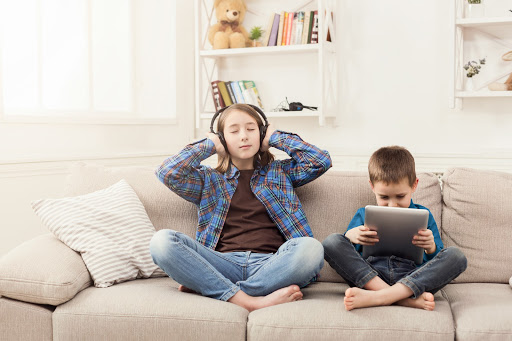
The effects of coronavirus have left many parents at home in the role of Mom or Dad, and now, also the Teacher. Many schools have initiated virtual learning at-home with shortened periods of learning online, where only certain subjects are covered. One thing that has been lost and won’t be used in many at-home learning curriculums is music class and musical education. Unfortunately, due to budget cuts and cut-backs that require only the “core” studies within the curriculums, music has fallen by the wayside.
However, music education is essential to children and their development. Music has been shown to improve academic skills by increasing memory and recall within the brain. It also has added social benefits, helps with confidence, and gives children the ability to express themselves and their feelings in a healthy way.
Here are some great ways that you can be sure to still incorporate music and music education within your child’s new routine of learning at home.
ENROLL YOUR CHILD IN ONLINE MUSIC LESSONS
One of the easiest ways to ensure your child is including music within their routine and development is to enroll him or her in online music lessons. This takes the guesswork for you to try to come up with something musical to provide the music education while ensuring that they are still incorporating it into their routine while at home.
Music To Your Home lessons can give your child access to an expert with extensive knowledge about singing or playing an instrument, especially a beginner instrument like the piano. Your child can learn to practice from their comforts of home, and take up an instrument of their choice. Maybe you have a child who loves to bang on pots and pans or another that sings along with every movie. You can take those interests and enrich your child, combining music and education.
One thing to remember with music lessons is that in addition to the lesson time itself, you need to add in practice time to your child’s routine. This is great for working parents who need to be sure their children are busy during the workday, so not only do you account for the lesson but also set aside a decent chunk of time (20-30 minutes) for practicing as well.
MUSICAL ARTS AND CRAFTS
Since music pairs well with the arts, another way that you can include part of your child’s schedule for learning is to include some craft time, while incorporating music as well. You can simply have music playing in the background while your child works on crafts since it can help with productivity and focus. You can also create crafts surrounding music education and learning, such as creating an at-home instrument that your child can play or composing an original song with glue and color paper.
You can even incorporate music theory with a craft too! If you have a piano to learn with at home, have your child begin labeling the piano keys to learn each key and later, key signatures. There are other known benefits to piano learning as well, so if you are unable to give your child the lessons, they can still find a lot of free resources, like online tutorials, to begin their musical journey.
If you have more than one child, you can make a game out of creating a musical instrument and a song. You could have them compete to see who’s instrument can play better, or who can create the “best” song to perform in a concert for their grandparents over an online conference later or family online event. You can also have them combine their homemade instruments and create a song together to play or sing.
MUSIC CLASS BARTERING
It’s possible that there is someone nearby, a friend or relative that is gifted in music. If you can collaborate with that person to have them teach your child/children online, this is another way that you can ensure your child is still learning music while at home. It can be difficult for working parents to watch over your child when they are learning virtually, so it can be helpful to have someone you trust doing so for you.
Taking it a step further, you might be able to barter your trades. If you are really good at cooking, painting, crafts, or some other important aspect of learning not being taught virtually, and you know someone gifted in music, you can barter with each other so you can teach their kids online, and have them do the same for yours. This way, it doesn’t cost anything but you still ensure your children have developmental learning in music.
PARTICIPATE IN ONLINE MUSICAL GAMES AND WORKSHOPS
Many music teachers and instructors have pivoted to online teaching, and are holding more than just music lessons. There are many online workshops and games that you can have your child participate in, making music fun while also learning.
Some of these are live and have to be prepaid, but others you can schedule at your own leisure, which gives you the freedom to make the time in your child’s routine without being told when to participate as well, so that’s a great option to look into. Having pre-recorded videos or online music workshops and games that you can access online can help you with putting your child into their structured schedule.
There is a great online resource that you can inform your school about (especially if music has been cut from virtual learning), called Music Workshop EDU, where for free, parents can enroll their children into online workshops for education regardless of experience or location.
MUSICAL EDUCATION IS ESSENTIAL FOR DEVELOPMENT
If it has not been said enough, music education is important. Even something as simple as creating an environment with music in the background for your child’s learning can help. Other suggestions to keep it simple:
-
Have them learn a new children’s song each week, and coordinate each song with upcoming events or holidays (think “Twinkle Twinkle Little Star”, “Down By the Bay,” etc.)
-
Sing while they do their homework or chores, taking a well-known tune of something, and making up their own parody.
-
Find the notes in some of their favorite songs on the piano, guitar, or some other instrument you may have at home.
There are multiple free online resources to ensure your child’s development is aided with music, as well as various online lessons and courses that you can enroll them into. The bottom line is that keeping musical education within their curriculum is beneficial, and should be essential.



























